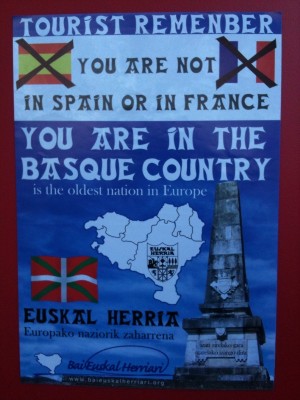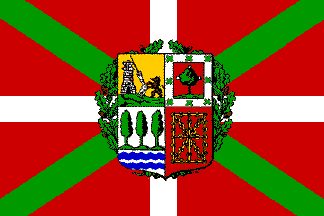Culture: Basque Country
by: Jackie Calderon

Who are the Basques?
The Basques are a culturally distinct Christian group that straddles the mountainous region between modern-day Spain and France. According to a census from 2001, there are between 2 million and 3 million people living in Spain’s Basque regions. The Basques have never had their own independent state, but have enjoyed varying degrees of autonomy over the centuries under Spanish and French rule. About half of the residents of the three Spanish Basque provinces—Vizcaya, Guipuzco, and Alava—speak fluent Basque or understand some of the language. Basque nationalists include other areas with smaller Basque-speaking minorities—including the Spanish province of Navarre and the French departments of Labourd, Basse-Navarra, and Soule—in their vision of a Basque homeland.
Cultural Background:
The Basque Country, or Euskal Herria in Basque. The Basque country spans the border between France and Spain. It has an autonomous culture and language, whose roots are believed to extend to the Paleolithic period. The area was relatively self-governing until around the turn of the 19th century.
The Basques are a small ethnic group of around two million people living in what is known as “Basque country,” located in northern Spain and southwestern France. The Basque people are the oldest ethnic group in Europe, reflected by their language Basque, which is an isolated language free of Romance or any other language heritage. The Basque people are strong and proud, and have survived many conquests around them, usually maintaining their own independent government throughout. Most controlling powers around Basque country were content to leave the people alone, until dictator General Francisco Franco took hold in Basque territory in 1937.
Francisco Franco Bahamonde was the dictator of Spain from 1939 to his death in 1975. General Francisco Franco denounced the Basque government and made the Basque language, as well as Galician and Catalan, unrecognized by the Spanish government and illegal to speak in public. The Basque language was the most persecuted, and nearly became extinct. Euskadi ta Askatasuna (ETA), roughly meaning “Basque Fatherland and Liberty,” was established in 1959 to protect the language and traditions of the Basque people from the smothering presence of General Franco. The ultimate goal of ETA was to create an independent Basque homeland and government. In the beginning, ETA was a non-violent activist group. However, violent actions quickly took over as the means to an end for ETA.







 This is the default footer layout. You can easily add or remove columns in the footer.
This is the default footer layout. You can easily add or remove columns in the footer.
Recent Comments